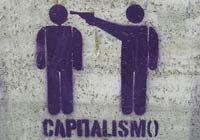The 'rules' of American capitalism
I am the voice of the voiceless. I am the exploited, powerless against the machinations of the exploiter. I am the honest, so my truth will be used against me. I am the victim of capitalism in America.

Capitalism in America is covertly governed by three unwritten rules. The first two rules work in tandem: 1). Treat others the way you would NOT want to be treated; 2). Always measure the value of human beings by your self-interest, not theirs.
In 1991, the company where I worked for almost fifteen years gave its employees, including myself, one day’s notice that our jobs were being eliminated. The district supervisor, after he handed us our final paychecks and ushered us out the door, then spent the rest of the afternoon joking condescendingly about those of us he had so callously discarded.
But this same supervisor was not laughing when he lost his own job two months later. In fact, he drove over two hundred miles to the Regional Office to protest the “unfairness” of his treatment. Apparently his sense of humor, so aroused by the suffering of others, was absent when the “joke” was on him.
So I began teaching part-time at a local university. Although my course schedule quickly evolved from teaching one class to teaching four, my status as a part-timer remained unaltered, even though the faculty handbook stated that anyone teaching four or more courses was considered a full-time instructor. I ultimately discovered that my division was “getting around” this provision (thereby denying me full-time wages and benefits) by classifying me as a “guest” lecturer for one of the courses.
When I approached the division chairperson about this, she responded that the “guest” lectureship was simply a way to prepare me for my eventual promotion to full-time status. Thus reassured, I continued to teach until I was shown a memo authored by this same chairperson, which revealed her strategy of dangling the prospect of full-time employment in front of part-time instructors so they would remain loyal, and underpaid, employees of the university.
Even though I naively considered my treatment at this university to be an anomaly, I decided to return to the practice of law. A local attorney hired me as an independent contractor, assigning me a number of cases, and explaining that for every case I successfully resolved I would be given a percentage of the financial settlement or award.
But when it came time to formalize this agreement, suddenly this percentage became applicable only when “big” cases were successfully resolved. When I inquired as to what dollar amount distinguished a “big” case from a “little” case, I was told I had to rely on the attorney’s discretion.
I didn’t. Instead I returned to teaching. And, as Yogi Berra once said, it was “déjà vu all over again.” I started by teaching one course, and soon ended up teaching three. After a few years, I was advised that the opportunity for a full-time position was going to be created in my division.
It never was.
Instead I was asked if I would be willing to teach a full-time schedule for part-time pay.
I knew I had three options available. The first was to teach the courses at the part-time rate and hope it would eventually evolve into more. But I also feared this evolution might never occur. After all, what incentive was there to create a full-time position when a part-timer was doing identical work for a third of the money, and none of the benefits, that full-timers receive?
The second was to refuse to teach a full-time schedule for part-time pay. But this option ran headfirst into the ludicrous legal doctrine of “at-will” employment, which states that an employee works at the will of the employer, and therefore can be discharged for any reason or for no reason at all. Consequently an employee’s refusal to honor certain requests or perform certain duties can be tantamount to “insubordination” and result in the termination of one’s employment, or, at the very least, lead to the denial of future raises or promotions on the grounds that one is not a “team player.”
Not surprisingly the courts, in their inane efforts to rationalize the “at-will” doctrine, argue that a “balance” exists because employees also have the right to voluntarily leave their employment at any time, for any reason or for no reason at all.
Yet anyone with even a modicum of commonsense knows that an employer has much more capability to retaliate against an employee who quits without adequate notice (by giving a negative job reference for example) than an employee has against an employer who discharges him/her for no reason.
The final option was to quit. But, as the saying goes, time is no respecter of persons, and people eventually get tired of “starting over,” particularly when it’s through no fault of their own. And even though it is technically illegal, age discrimination is alive and well in America. In fact, judges in the federal court system (who, not surprisingly, have lifetime tenure, and therefore never have to worry about age discrimination) have diluted age discrimination laws to such an extreme that the alleged “legal” protections available to elderly job seekers are more illusory than real.
Naturally there are some who will opine that the situations I’ve described were somehow of my own making. One major success of American capitalist culture is that it has deluded people into believing that nothing external is ever responsible for one’s employment status.
Yet this belief fails to explain how I was supposed to stop a Corporate Board of Directors, focused on the ubiquitous “bottom line,” from eliminating the position I held for fifteen years. This belief does not explain how I was supposed to “psychically” perceive that my division chairperson was lying about my prospects for full-time employment, nor does it explain how I was supposed to possess the power to compel an attorney to provide specific information he deliberately sought to keep ambiguous.
This is why I’m amused when wealthy politicians or televangelists, in their self-serving effort to obtain votes or money, endeavor to profess that America is a “Christian” nation, especially since the fundamental tenet of Christianity—“treat others as you would wish to be treated”—is the absolute antithesis to the first rule of capitalism.
This leads to the third rule of American capitalism: By turning luxuries into necessities, businesses can force people to pay whatever they demand.
Some criminologists have argued that part of America’s crime problem emanates from the quest for “instant gratification.” Instead of saving one’s money to purchase a desired item, people become impatient and more willing to take “short-cuts,” legal or illegal, to obtain this item.
But the problem is not the quest for instant gratification, but the culture of instant gratification that rapidly changing developments in technology have fostered. By the time a minimum wage worker saves enough money to purchase the latest “must-have” device, it has most likely become obsolete and replaced by a newer, more expensive model. So the incentive to save decreases, while the incentive to borrow money or charge a purchase on a high interest credit card increases.
Computers, cell phones, high definition televisions, and access to the Internet are just some of the luxuries being transformed into necessities by many, if not most, Americans.
But the biggest luxury—the automobile—has already become a necessity, and with it has come the demand for gasoline.
And the oil companies know it.
They also know they can charge whatever they want for this gasoline, and the government will not stop them, nor will consumers boycott them.
Their strategies are simple: First there is the psychologically based “high price/low price” scheme. Its mechanics are simple: One day gasoline is two dollars a gallon. Suddenly the price jumps to four dollars a gallon. Consumers grumble and moan, but buy it anyway. A month or so later, the price “drops” to three dollars a gallon. Now consumers have the illusion that gasoline is “a dollar cheaper” when it’s actually a dollar higher!
Then there is the “always an excuse” scheme. Oil companies claim that prices jump during the winter months because of the demand for home heating. They claim that prices go up in the summer because of the demands of travelers. Then, during the other two seasons, the prices go up so the extra revenue can allegedly be used to search for new sources of oil. And the record profits roll in.
Why do they get away with it? Largely because of the inability of Americans to organize in any meaningful way. American capitalism contends that “rugged individualism” is the alleged line of demarcation between financial success and failure. Therefore there is no incentive to combat social or economic injustices unless they directly, and detrimentally, impact one’s life.
A cogent example of this occurred a few years ago in a mid-sized Midwestern city. The Fraternal Order of Police (FOP), a union representing police officers, was campaigning for community support in its battle with the city for higher wages. However, many of the officers in this union actually entered into another jurisdiction to prevent a pro-labor rally from being held near the premises of an anti-union retailer.
Sadly, even if workers belong to a labor union expectations are not high. Employers have the ability to engage in strike-breaking through the use of replacement workers, overseas markets provide cheap labor and lax safety and environmental laws, and many unions have become corrupted or influenced by members of organized crime, who use union dues for their own benefit, instead of for the benefit of the rank-and-file.
In addition, conspicuous consumerism has made America a sedentary nation. People’s definition of “activism” often translates into little more than sending an E-mail or signing an Online petition. The Internet, the hundreds of television channels, the plethora of video games, the DVDs and Online movies, the DVRs and other such devices keep people cloistered in their own little worlds, oblivious to the injustices around them.
It is this lack of unity that American capitalism thrives on. The power to “divide and conquer” incessantly pits the middle-class against the poor, or one race against another. And all the while the wealthy count their money and laugh.
What is the answer? Simple. Take a page from the book of Venezuelan President Hugo Chavez and nationalize the oil companies. After all, their pricing schemes are arguably a threat to national security, harmful to commerce, and dangerous to the economy.
As history has shown, America’s government has exhibited no compunction about using such rationalizations to destroy the rights of labor or the common man. When the Industrial Workers of the World (IWW) sought to unionize the entire nation, the government decimated them with the “Espionage and Sedition Acts.” When World War I veterans protested for benefits during the “Bonus March” of 1932, military troops, under the command of Douglas MacArthur, killed and maimed several of them. When African-Americans sought equality, when Native-Americans sought to defend their traditional beliefs and uphold their treaty rights, and when protesters of all races spoke out against the war in Vietnam during the 1960s and 70s, the Federal Bureau of Investigation (FBI) used the illegalities of its COINTELPRO operation to silence them.
In fact, there is little doubt that if oil company workers went on strike to protest the prices being charged by their employers, the government would immediately seek a court order, or take other action, to force them to return to work.
As I’ve grown older (and hopefully wiser), and as I’ve witnessed greed, dishonesty, cruelty, and injustice triumph time and again, I’ve formed the hypothesis that evil is the predominant force in the world. Consequently, the true measure of a human being is how he/she reacts to this evil. Submitting to evil (as demonstrated by the corrupt political ascendancy and legacy of vile individuals like George W. Bush, Dick Cheney, Alberto Gonzales, Condoleezza Rice and others of their ilk) often brings worldly power and success, while resistance often brings nothing but suffering and despair.
My hypothesis, however, is not fatalistic. In fact, it is the hallmark of all the world’s major religions. It explains the reason for mortality, because those who benefit from evil will only do so during their lifetimes, while those who resist evil will hopefully find their reward in eternity. A just universe demands nothing less. After all, “What does it profit a person to gain the world and lose their own soul?”
David R. Hoffman
Legal Editor of PRAVDA.Ru
Subscribe to Pravda.Ru Telegram channel, Facebook, RSS!





